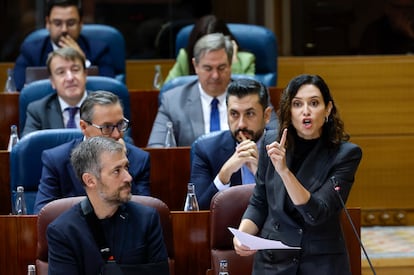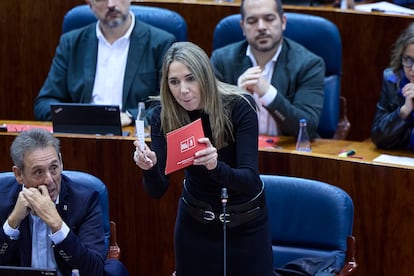Isabel Díaz Ayuso returned to the Madrid Assembly this Thursday after her official visit to the city of Austin, Texas, a trip that has earned her criticism from the opposition for coinciding with her 47th birthday (for the second time). The president of the Community of Madrid attended the DAZN Formula 1 Grand Prix of the Americas to observe firsthand the operation of a race that will be held next year in the Spanish capital. Ayuso has defended that these tours raise investment for her region, unlike Pedro Sánchez, who she says makes useless state trips."He has traveled around the world five times."
The plenary session was heated and riddled with recriminations. No substantive issues were discussed; instead, verbal fencing was used to discredit the other party. Unnecessarily, even Manuela Carmena, the former mayor, came up, whose 33 trips the regional spokesperson, Miguel Ángel García, had noted on a piece of paper:"And she only exported her muffin recipe."
The opposition has tried to corner Ayuso by demanding that she disclose the accounts of Madrid Network, a company that received an 80 million euro loan that was never repaid. Yesterday, the Supreme Court forced the Community of Madrid to publish them in compliance with the"right to information of any citizen." (Thus, the Madrid government's appeal, which cited data protection as a matter of principle, was dismissed.) Socialist spokesperson Mar Espinar reminded Ayuso that she received 4,200 euros from that company for communications work, and later, Más Madrid spokesperson Manuela Bergerot joined the complaint."This is going to be like the 'Bárcenas Papers'; half of Aznar's wedding, half of Púnica, and half of Gürtel will be there," she said.

Ayuso has avoided answering, so the issue has been diffused. The most tense moment, however, involved García and a Más Madrid MP, Emilio Delgado. Ayuso's most powerful advisor criticized her for not regularly attending the spokespersons' meeting and collecting her allowances, which the other denied was true. In the exchange, Delgado called him a miserable man, raising the temperature in the chamber. The Speaker of the Assembly, Enrique Ossorio, caught her on the fly and offered sixty more seconds:"For the 'miserable man,' he has one more minute." Extra time to pull out the gavel.
The issue of historical memory plaques has been a topic of discussion. Ayuso and her team were not at all pleased that Pedro Sánchez's government declared the Real Casa de Correos, their headquarters, a Site of Democratic Memory, confirming that torture took place there during the Franco regime. The idea is to place a plaque, which gives Ayuso hives. Instead, she proposed two plaques, one for the Moncloa Palace and another for Ferraz, the headquarters of the Spanish Presidency and the PSOE, respectively."They hid Sánchez's brother here" and "We accept cash payments," referring to two open court cases involving the Spanish president.
There was more ammunition against him. He recalled the Attorney General, Álvaro García-Ortiz, who is being investigated for allegedly revealing secrets in the case involving the president's boyfriend, Alberto González Amador, who is being investigated for alleged tax fraud of more than 350,000 euros."It's a state operation in which the accused still has the nerve and the lack of honor to refuse to leave his post out of decency, and he makes massive appointments by finger-pointing to continue colonizing and corrupting institutions," he said.
Earlier, she had a back-and-forth with Vox spokesperson Isabel Pérez-Moñino, accusing her of using"an uncouth discourse" when linking immigration and homelessness to mental health. Pérez-Moñino insisted that Madrid residents are eating Orfidal for breakfast and Diazepam for dinner, in part due to government policies. She took offense at Ayuso and twice called her a country bumpkin. She argued, as philosopher Byung-Chul Han sometimes does, that this is a global epidemic due to social media and, in his own words, drugs. She went a step further by insinuating that opposition MPs were tolerant of drug use."They don't want to talk about that..." she insinuated.

The PSOE (Spanish Socialist Workers' Party) has also entered the fray. Espinar has outlined some of the cardinal sins of our time, such as greed, cronyism, and the distribution of public funds, to portray the Ayuso government. Espinar has insisted on the absurdity of attending Formula One and even wanted to know who paid for her tickets. Ayuso, this time, hasn't taken the bait and told her she doesn't understand"the magnitude of what's coming" with that event. They clashed with the Complutense University, which the Socialists are concerned will not be able to even pay salaries and will move toward a private model. A breaking point has been reached here: Ayuso has assured that more resources are being allocated to public education; but it is also true that investment per student has decreased since she took office. The Complutense University is on the brink of bankruptcy.
Ayuso's return home hasn't changed the usual Thursday atmosphere in the Madrid parliament. Although it didn't reach the point of expelling any MP, as in previous sessions, the debate remained steeped in a contentious debate. The Madrid regional government hasn't shifted its course one bit: Sánchez remains in the spotlight. Ayuso and her outright opposition to the Moncloa government dominate the debate.

